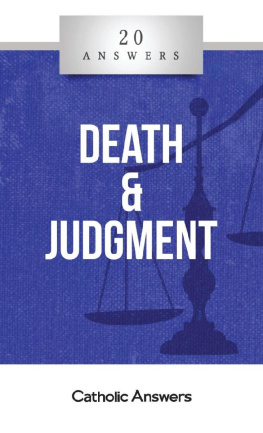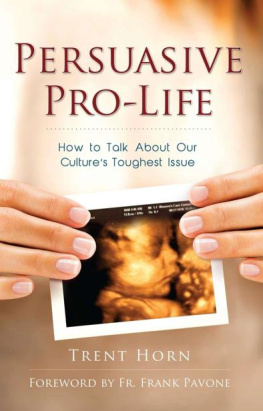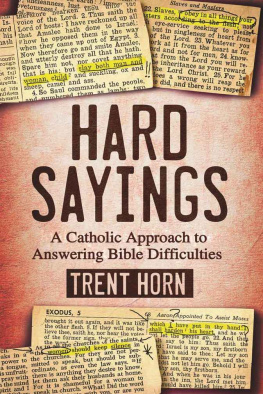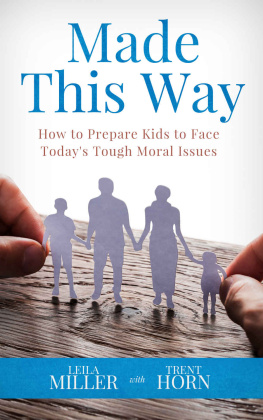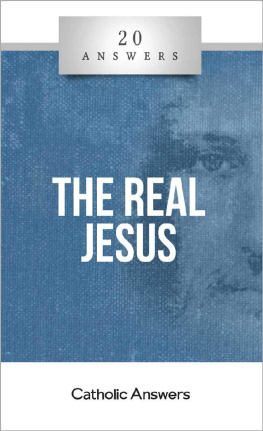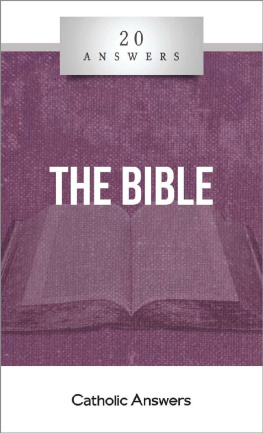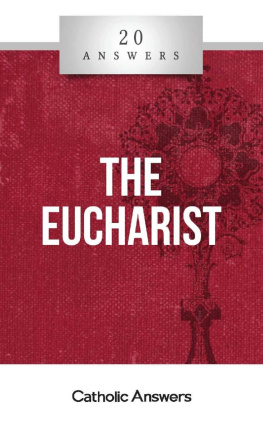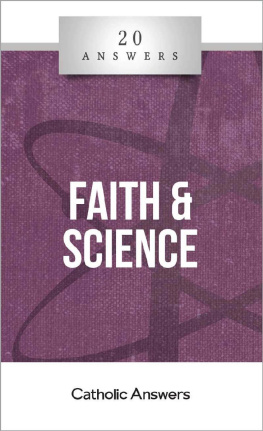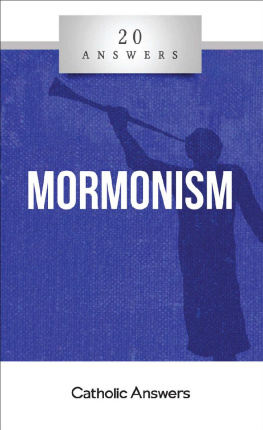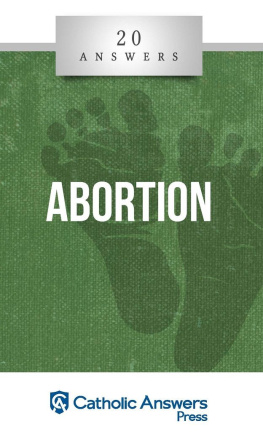Trent Horn - 20 Answers- Death & Judgment
Here you can read online Trent Horn - 20 Answers- Death & Judgment full text of the book (entire story) in english for free. Download pdf and epub, get meaning, cover and reviews about this ebook. year: 2016, publisher: Catholic Answers Press, genre: Religion. Description of the work, (preface) as well as reviews are available. Best literature library LitArk.com created for fans of good reading and offers a wide selection of genres:
Romance novel
Science fiction
Adventure
Detective
Science
History
Home and family
Prose
Art
Politics
Computer
Non-fiction
Religion
Business
Children
Humor
Choose a favorite category and find really read worthwhile books. Enjoy immersion in the world of imagination, feel the emotions of the characters or learn something new for yourself, make an fascinating discovery.
- Book:20 Answers- Death & Judgment
- Author:
- Publisher:Catholic Answers Press
- Genre:
- Year:2016
- Rating:5 / 5
- Favourites:Add to favourites
- Your mark:
- 100
- 1
- 2
- 3
- 4
- 5
20 Answers- Death & Judgment: summary, description and annotation
We offer to read an annotation, description, summary or preface (depends on what the author of the book "20 Answers- Death & Judgment" wrote himself). If you haven't found the necessary information about the book — write in the comments, we will try to find it.
20 Answers- Death & Judgment — read online for free the complete book (whole text) full work
Below is the text of the book, divided by pages. System saving the place of the last page read, allows you to conveniently read the book "20 Answers- Death & Judgment" online for free, without having to search again every time where you left off. Put a bookmark, and you can go to the page where you finished reading at any time.
Font size:
Interval:
Bookmark:
20 Answers
Death & Judgment
Trent Horn

20 Answers: Death & Judgment
Trent Horn
2016 Catholic Answers
All rights reserved. Except for quotations, no part of this book may be reproduced or transmitted in any form or by any means, electronic or mechanical, including photocopying, recording, uploading to the Internet, or by any information storage and retrieval system, without written permission from the publisher.
Published by Catholic Answers, Inc.
2020 Gillespie Way
El Cajon, California 92020
1-888-291-8000 orders
619-387-0042 fax
catholic.com
Printed in the United States of America
978-1-941663-95-0
978-1-941663-96-7 Kindle
978-1-941663-97-4 ePub
Table of Contents
Introduction
Eschatology is a branch of theology that studies the Last Things, of which there are roughly two kinds. The first are the four traditional Last Things every individual must facedeath, judgment, hell, and heaven. Every person will face the first two, but their choices in this life will decide which of the last two they will participate in for all eternity. Eschatology sheds light on what these things are and how we can prepare for their inevitable appearance in our own lives.
The other Last Things are the events that will take place at the end of the worldespecially the resurrection of the dead and the final judgment of mankind. Almost every world religion, and even secular fields of study like physics and cosmology, teaches a particular eschatology, or set of beliefs about the end of the world. Many religious sects, including some Christian groups, imagine dramatic end times scenarios filled with fire and mayhem. However, Catholic eschatology is not focused exclusively on the how, but the who. The end of the world finds its meaning in the return of the person who saved itJesus Christ.
Its fitting that the liturgical season that begins with readings about the end of the world is the season of Advent. Although most people identify Advent with Christmas, the Church understands that our recollection of the first coming of Christ helps us prepare for Christs eventual Second Coming at the end of the world. Even if Christ does not come in our lifetimes, we will eventually meet him at the end of our earthly lives. This makes it all the more necessary to correct misunderstandings people have about the Last Things and better prepare them to face these inevitable ends.
1. What is death?
All physical objects are composed of matter, but there is an observable difference between living and nonliving matter. Living matter is able to grow and adapt over time, sense the material world (in the case of animals), and even think rationally about it (in the case of humans). This is amazing given that in humans, for example, ninety-nine percent of our bodies are composed of only six nonliving elements: hydrogen, carbon, oxygen, nitrogen, calcium, and phosphorus.
All living things exist as a composite of soul and body. The soul is the organizing principle of life that animates the body and makes it living instead of dead. A cloud might dissipate but it doesnt die, because clouds (and other nonliving objects, like rocks) lack souls. Unlike living things, they lack a principle that unifies their parts for the good of the whole. They might dissolve or decay, but they cant die. However, when the soul is absent from a living body, that bodys parts stop coordinating together for the good of the whole. As a result, the living thing, be it a plant, animal, or human, breaks down or de-composes into its original parts. This is why death can be broadly defined as the reduction of a living thing to its component parts.
Some people mistakenly think that only human beings have souls, but all living things have souls. However, unlike humans, the souls of other living things are just as material and just as mortal as the parts they animate. When a plant or animal ceases to exist, the soul that animated this being ceases to exist as well.But human souls are different because they are immaterial , and so they continue to exist after death and cannot be destroyed (see answer 2).
When it comes to humans, the Catechism of the Catholic Church tells us that In death, the separation of the soul from the body, the human body decays and the soul goes to meet God, while awaiting its reunion with its glorified body (CCC 997). Unlike angels, who exist as pure spirits without bodies (CCC 330), humans exist as embodied beings who possess immortal souls. When humans die, they dont become angels. Instead, their disembodied souls continue to exist and await reunification with their bodies.
The Catechism tells us: Even though mans nature is mortal God had destined him not to die. Death was therefore contrary to the plans of God the Creator and entered the world as a consequence of sin (CCC 1008). When our first parents sinned in the Garden of Eden, they shattered the peaceful harmony and original justice God created. Their disobedience resulted in forsaking the grace God gave them, which would have protected them from suffering and death (CCC 400). They not only lost these graces for themselves, but also became unable to pass them to their descendants, who in turn could not pass them on to us. This is why Romans 5:12 says, Therefore as sin came into the world through one man and death through sin, and so death spread to all men because all men sinned.
The Catechism calls this original sin , or the transmission of a human nature deprived of original holiness and justice (CCC 404).Original sin is not a fault or crime we committed, because babies have original sin even though they have done nothing wrong (Rom. 9:11). Instead, original sin is an absence of Gods grace, which all humans inherited through our fallen nature.
Let me repeat, God did not create human death nor did he intend for us to die. This came about because, of the free choices of our first parents. Fortunately for us, Christs freely chosen death on the cross redeemed or bought humanity back from being under the power of death. We now have the opportunity to be partakers in the divine nature (2 Pet. 1:4), and death has lost its sting (1 Cor. 15:55). God hasnt changed our fallen, human nature (we still die physical deaths), but he has given us the opportunity to rise from the dead and attain glorious, everlasting life with him. According to the Catechism ,
Because of Christ, Christian death has a positive meaning... In death, God calls man to himself. Therefore the Christian can experience a desire for death like St. Pauls: My desire is to depart and be with Christ. He can transform his own death into an act of obedience and love towards the Father, after the example of Christ (CCC 101011).2. How do we know there is an afterlife?
One alternative to the Christian view of death is the atheistic or materialistic view of death. According to this view, just as the information on a computer ceases to exist when the computer is destroyed (provided the information hasnt been backed up anywhere else), the information in our brains that makes us us ceases to exist when our brains die. Since humans lack the ability to back up their mental experiences, it follows that once the body dies, or even if just a vital part of the brain dies, the person as a whole forever ceases to exist.
But there are several aspects of the human experience that contradict this materialistic view of man and its subsequent denial of the afterlife.
First, if humans have free will and can choose to be moral or immoral, then a persons actions cant merely be the result of chemical reactions in his brain. If they were, then no one could freely choose a course of action any more than a rock at the mercy of gravity and friction can choose which way to roll down a hill. Just as we dont hold landslides or tigers morally responsible for the harm they cause, equally, physical humans would also lack moral responsibility. But humans are morally responsible for their actions (or, we rightly say that human acts can be good or evil), which means human actions are not purely the result of physical processes.
Next pageFont size:
Interval:
Bookmark:
Similar books «20 Answers- Death & Judgment»
Look at similar books to 20 Answers- Death & Judgment. We have selected literature similar in name and meaning in the hope of providing readers with more options to find new, interesting, not yet read works.
Discussion, reviews of the book 20 Answers- Death & Judgment and just readers' own opinions. Leave your comments, write what you think about the work, its meaning or the main characters. Specify what exactly you liked and what you didn't like, and why you think so.

